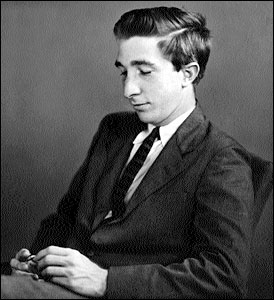
Sometimes, there are obvious truths in life that, when pointed out, take on a whole new meaning. At least, that’s how I felt after I read “Perfection Wasted,” by John Updike. Maybe my opinion of the piece was influenced by the fact that I immediately loved its title; but the poem really spoke to me. Its message is one that anyone could come up with: that every individual is unique, and that no one could ever replicate your exact path in life. But the manner in which it is said makes it feel like a new, original point.
Updike opens the poem as if in the midst of a thought, making the reader feel like they’ve arrived during the middle of a conversation: “And another regrettable thing about death/is the ceasing of your own brand of magic,/which took a whole life to develop and market…” (1-3). Writing it this way shows that the narrator has been going on for a while, and thus has a lot of complaints about death. Here he states that everyone’s unique “brand” merely fades away after death. Your whole identity simply disappears once you are gone, despite you having worked your whole life on it. Everything you have done, all of your mannerisms, just cease to exist. Things like, “the quips, the witticisms, the slant/adjusted to a few, those loved ones nearest…” (4-5) are no longer present; they die with you. No matter how long you labored to perfect the way you said punch lines, or told stories, or spoke with the people you were closest to, it all goes away in the end, regardless.

John Updike
The poet elaborates on the importance of this intimacy with friends and loved ones as he continues. He describes the sensation of being in sync with someone else when they laugh at one of your jokes: “…their warm pooled breath in and out with your heartbeat,/their response and your performance twinned” (9-10). That moment of perfect connection, of total understanding, is such a small but glorious thing, and yet it too goes away after you are gone. No matter how many jokes you cracked, that same feeling of oneness will never return to the people you care about, not in the exact same way; it was your connection, between the two of you, not between anyone else.
The last four lines of the poem, though made up of short sentences and phrases, convey so much:
The jokes over the phone. The memories packed
in the rapid-access file. The whole act.
Who will do it again? That’s it: no one;
imitators and descendants aren’t the same. (11-14)
The wonderful little memories you created with your loved ones will always exist, but only ever as images and sounds in the brain. That feeling of actually reliving those memories, the ones that occur when you recount them with the person you experienced them with, vanishes after their death. Only the two of you could ever share that bond. So although it’s tragic when our loved ones die, and things are never quite the same, it’s a good thing in a way, too: things shouldn’t be the same after they are gone. If they were, then we would never appreciate the people in our lives as much as we should. After all, they can never be replaced.
*John Updike photo credit: seattlest
Related Reading:
- Read more about John Updike
- “Grief and Regret” (SevenPonds)

 “Perfection Wasted” by John Updike
“Perfection Wasted” by John Updike


 “Hand to Earth” by Andy Goldsworthy
“Hand to Earth” by Andy Goldsworthy
 Trans Remembrance Project Provides a Community of Grieving
Trans Remembrance Project Provides a Community of Grieving
 Caring for a Dying Loved One? Be Gentle With Yourself.
Caring for a Dying Loved One? Be Gentle With Yourself.














